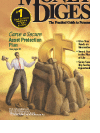Publication
Article
Physician's Money Digest
Maximize Your Retirement Savings Today
Author(s):
I nvestors are more concernedthan ever with planning fortheir retirement because of therecent bear market. If you're aphysician-investor who is 10 to 15years away from retirement, now isthe time to begin maximizingyour savings opportunities.This timeperiod is likely to be themost important in termsof earnings.
One way to supplementyour retirement income isto establish a delayedincomecharitable remainderunitrust. This is agood strategy to employ ifyou're a physician-investorwho has appreciated non–income-producing property,would benefit from atax deduction currently,would like to supplementyour income when youretire, and would like todonate a portion of yourestate to charity.
SAVINGS SOLUTION
Here's how it works. You beginby setting up a charitable trust andgift appreciated, non–income-producingassets to it, such as appreciatedstock. As with any charitableremainder unitrust, you elect toreceive income each year based ona set percentage of the trust'svalue. In the case of a delayed-incomecharitable remainderunitrust,you also add 2 specialprovisions tothe trust.
The first provisionyou add to thetrust states that ifthe trust income isnot sufficient to paythe percentage youelected, then thetrustee will pay theactual income thetrust produces. Forexample, if you wereto elect a 6% annualincome distributionbut the trust investments onlyproducd 1% in income, only 1%would be distributed to you. This isnot a problem, however, sinceyou're trying to "store up" assets foryour retirement, and you don't wantadditional income at this time.
Interest ratefears
The second provision you add tothe trust is a "catch-up" provision.This catch-up provision states thatany income "you were owed" thatwas not distributed to you will bedistributed when additional trustincome is available. : Don't be concerned abouttoday's low interest rates.Although the rates arecurrently at a 40-yearlow, you can expect ratesto rise in the future.
BEFORE AND AFTER
During the preretirementterm of your delayed-income charitableremainder unitrust, youwill invest in assets thatproduce little or no income,such as stocks orraw land. As stated earlier,this allows you to store upincome for the future.Once you're ready to retire,you'll sell these investmentsand reinvest theproceeds in high-incomeinvestments, such as corporatebonds, CDs, andhigh-dividend stocks.
By participating in this sort oftrust, you're able to make the mostof today and tomorrow: Youraccount achieves maximum growthduring your working years and thenachieves maximum income duringyour retirement years. Any excessincome earned by your trust can bepaid out to you as part of thecatch-up provision.
In addition, thesale of the appreciatedsecurities doesnot result in anytaxes because of thetrust's tax-exemptstatus. As an addedbenefit, your initialtransfer, as well asany future transfersto your delayed-incomecharitable remainderunitrust,will create immediatetax benefitsin the form of taxdeductions.
The amount of these deductionsis dependent on a number of factors,including the withdrawal rateyou choose, your life expectancy,and the life expectancy of anycobeneficiary. Ultimately, after thedeath of all beneficiaries, your designatedcharity will receive theremaining trust balance.
Stewart H. Welch III,founder of the WelchGroup, has been rated1 of the nation's topfinancial advisors byMoney, Worth, andMedical Economics. Heis also the coauthor ofJ. K. Lasser's New Rulesfor Estate and TaxPlanning (John Wiley &Sons, Inc; 2001). Hewelcomes questions orcomments from readersat 800-709-7100 orwww.welchgroup.com.This article was reprintedwith permissionfrom the BirminghamPost Herald.
